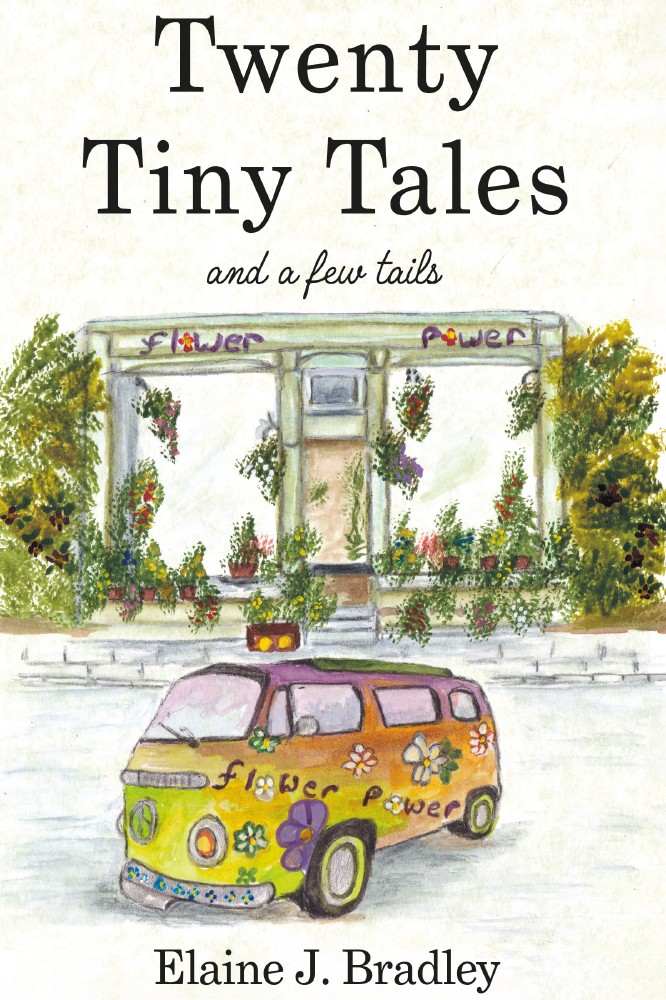I have been writing short stories from being very young, not with any particular reason for doing it, other than my own enjoyment. Apart from those which were my English homework essays, my stories were usually not read by anyone else, the creation of them just being a private hobby.

Twenty Tiny Tales
I loved dogs, and at the age of ten was allowed to have one of my own, after which most of my stories involved dogs, especially my Rough Collie, Shep. My English teacher in my grammar school days used to set the class a composition for homework every Monday. When my book was returned marked there would often be a comment in red ink in the margin: “Shep strikes again!” or “Shep, I haven’t seen him for some time!”
Throughout my life I have written lots of stories featuring dogs, although I have also tried lots of other themes and have greatly enjoyed collecting suitable information for them.
My First Tip: Enjoy your writing. Begin with a topic you are interested in as you are bound to be knowledgeable about it.
Choosing a Theme for My Next Story
Many tales have been created by a personal incident or experience, in which my imagination takes over and turns it into something totally different: fictional of course! It could be scary, weird or hilarious. I have visited places, which I found very atmospheric, such as Museum of Childhood in Edinburgh, lonely, deserted beaches with rugged rocks, and also a peat bog in a mountainous region, which one of my dogs fell into. I often take photographs to remind me of situations and also write down facts about the place and my feelings in case I want to turn it into a story. Meeting people on my travels or witnessing an incident which has moved, can also inspire me to create my fictitious characters.
Tip 2: Collect information about your experiences with people, places or incidents, etc. And use your imagination to turn them into something different or amazing!
Other Short Story Writers
I believe that it also helps to read other peoples’ short stories and to judge how effective they are to you, then analyse why. I love “Twist in the Tale” works and am always besotted if one such story gives me a real shock, moves me to tears or makes me laugh my socks off. I have tried many of these myself and a main factor is to make the end believable, but not to try and give it away too early, especially not in the title. Sometimes I start a story with a title, but often may alter the title once my story is completed. Quite often the title of the story comes last.
Also the end of some stories can cater for the readers’ own imagination, and allow them to decide how the end of the story came about and what would happen next… In some cases I like to leave it this way, and love to get feedback on what they think. The shortest story I have ever come across is:
“For sale, baby shoes, never worn.”
By Ernest Hemingway
This gives the reader great scope for imagination as to why the baby didn’t get to wear it’s shoes.
Tip 3: Read and analyse short stories by other authors.
Length of Short Stories
As you can see, a story can be as short as six words. If writing for a newspaper, magazine or competition it will request a certain number of words in which case you may need to write and re-write to bring your story within the limit. It is easy to get carried away with your writing, especially if the tale is exciting you. My advice is to write the story the way it inspires you. Then, if you are happy with the content, review and consider whether you can edit some of the descriptions of people or scenes, making it more concise but still effective.
Tip 4: Read, edit and condense, keeping the important aspects of the tale.
Proof Reading
Proof reading is a very important part of ensuring that your story that will be acceptable to publishers, editors of magazines, and any readers of it so…
Tip 5: When you are satisfied with your story, ask friends or family members to read it and give their opinion on content, as well as spelling, grammar, punctuation, etc that you may have missed. Feedback is very important!
I hope that this article has helped anyone wishing to write short stories. As usual, I could say so much more, but I also have a word limit. Good Luck.
And thanks to Troubador for helping me to publish my first book of Tiny Tales.

